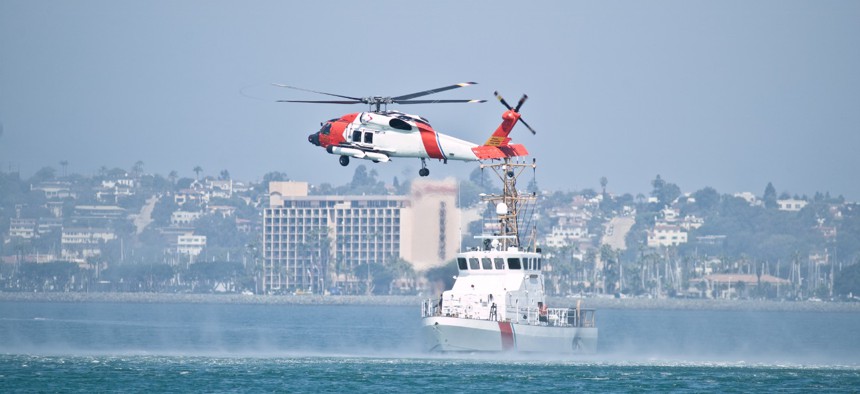
rcp / istock
GAO: Coast Guard Can Do More to Monitor Telework Use
Early in the pandemic, the service suffered from inadequate bandwidth and a laptop shortage, although those issues were alleviated by summer 2020.
A government watchdog recommended last week that the Coast Guard improve the way it documents how personnel have been using telework over the course of the pandemic.
On July 16, the Government Accountability Office issued a report on the Coast Guard’s efforts to protect workers during the COVID-19 pandemic through telework and by staggering shifts and providing personal protective equipment. Although the Coast Guard has had a telework program since 2014, its reliance on remote work drastically increased during the pandemic for employees with portable work.
Like many agencies, the service struggled in the early months of the pandemic, both due to a laptop shortage and insufficient network bandwidth to accommodate the large influx of teleworking employees.
“For example, officials we interviewed from two sectors noted that the Coast Guard’s network was slow and often crashed or dropped users who then had to attempt to log back onto the system—a process they noted was often time-consuming,” GAO wrote. “In another example, officials from one sector stated that insufficient bandwidth meant that only some personnel could access the network remotely, while other were only able to access to check their email.”
Coast Guard officials also noted that the network instability made remote training more difficult. Efforts to upgrade the network bandwidth and the acquisition and provisioning of more than 2,500 laptops in the early months of the pandemic alleviated most of these issues by summer, however.
But GAO’s examination of the Coast Guard’s telework program uncovered other issues with the branch’s telework policy. Although the Telework Enhancement Act requires teleworking employees to complete training, sign telework agreements before they begin working remotely and review those agreements annually, Coast Guard’s headquarters does not have a centralized record of its employees’ telework agreements.
“[Officials said] that these personnel and their supervisors are solely responsible for retaining local copies of these agreements—either electronically or in a paper-based format—and do not submit these copies to management or further document that they have been completed,” the report states. “Coast Guard headquarters officials confirmed that they do not track whether all applicable personnel and their supervisors have valid telework agreements. As a result, they were not able to tell us how many telework agreements were in place across the Coast Guard or how many teleworking personnel may not have the required telework agreements in place.”
Additionally, during the pandemic, active duty Coast Guard personnel were required to regularly self-report their COVID-19 and telework status, while civilian and reserve employees were merely “encouraged” to self-report their status. As a result, GAO found that the Coast Guard’s data were unreliable.
“The data consistently include thousands of active duty, reserve and civilian personnel with ‘unreported’ and ‘unknown’ COVID-19 and telework statuses, respectively, which raises questions about the accuracy and completeness of these data,” the report states. “For example, according to these data, the number of personnel with ‘unreported’ COVID-19 statuses ranged from a low of 1,959 individuals in August 2020 to a high of 4,455 individuals in April 2021. Further, the number of personnel with ‘unknown’ telework statuses ranged from a low of 2,479 individuals in August 2020 to a high of 5,108 individuals in April 2021.”
GAO recommended that the Coast Guard develop additional internal controls to ensure all teleworking employees have valid telework agreements in place, as well as controls to ensure that supervisors review these agreements annually and document that process. And the agency recommended that the Coast Guard ensure that weekly audits of COVID-19 and telework statuses are verified as accurate and complete.
In response, the Homeland Security Department, which oversees the Coast Guard, concurred with all three of the recommendations. The department said that the Coast Guard will issue servicewide notifications to remind personnel about the requirement to have or update their telework agreements on an annual basis. It also highlighted a number of directives over the last year aimed at improving employees’ reporting of their COVID-19 and telework statuses.
“To address the intent of our recommendation, the Coast Guard will also need to ensure that required weekly audits are being conducted to verify the accuracy and completeness of data on the COVID-19 and telework statuses of Coast Guard personnel,” GAO wrote. “We will monitor DHS’s and the Coast Guard’s efforts in addressing these three recommendations.”







